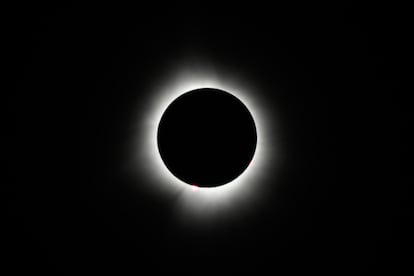The government's commission for the August 2026 eclipse launches: a massive event in empty Spain.


With less than a year to go until the first total eclipse to cross the Iberian Peninsula since 1905, the Government has convened the interministerial commission for the 2026-2027-2028 eclipse trio in Spain for the first time, at the Royal Astronomical Observatory in Madrid. The working group's main objective will be "to ensure that observations proceed in a safe and orderly manner." On August 12, 2026, Spain will be the only country in the world where the next total eclipse can be safely observed, followed by another on August 2, 2027, and an annular eclipse on January 26, 2028.
Initial official estimates estimate that several million additional tourists will arrive next year to witness one of the few total eclipses to pass through Europe during the 21st century. Furthermore, the astronomical coincidence of three top-category eclipses passing through the same country in three consecutive years has led the Ministry of Science, headed by Diana Morant, to promote a specific commission—whose creation was approved by the Council of Ministers on July 29—to address this organizational challenge, unprecedented in the history of Spain.
The inter-ministerial working group is chaired by Juan Cruz Cigudosa, Secretary of State for Science, Innovation and Universities, who in a recent interview with EL PAÍS stated that the solar eclipse on August 12 "will mobilize a huge number of people to areas with better visibility, which will also coincide with the desertification of Spain, with countryside, meadows, forest edges... during a period in which, as we are seeing these days, the risk of fire is extremely high." Identifying recommended observation sites and more accurately estimating the influx and number of trips—which are expected to be massive—will be, according to Cigudosa, some of the first challenges for the commission, whose vice-chair is José Antonio Santano, Secretary of State for Transport and Sustainable Mobility.
In addition to the Ministries of Science and Transport, which coordinate the government's action on this matter, senior officials from the Ministries of Defense; Finance; Interior; Education, Vocational Training and Sports; Industry and Tourism; Territorial Policy and Democratic Memory; Ecological Transition and Demographic Challenge; Culture; Economy, Trade and Business; Health and Social Rights; and also from the Ministry of Consumption and the 2030 Agenda were present at Thursday's meeting. In total, 13 ministries make up this committee. Experts from the National Astronomical Observatory, the Institute of Astrophysics of the Canary Islands, and the Institute of Astrophysics of Andalusia also participated in its first meeting.
The organizational challenges in the short year remaining are numerous. In recent decades, interest in total eclipses has skyrocketed, causing monumental traffic jams and multiplying the price of accommodation in the areas covered by the path of totality. In some ideal locations for observing, hotel reservations have already sold out. During recent eclipses in the US, this overcrowding and speculation on accommodations—and protective eyewear—have been accompanied not only by an increased risk of fires due to mass gatherings outdoors, but also by an increase in fatal traffic accidents.
In addition to "an initial analysis of the needs to prepare, organize, and coordinate the safe observation of this extraordinary astronomical phenomenon" and avoid civil protection problems, at this first meeting Cigudosa emphasized taking advantage of the opportunities for scientific outreach, education, and scientific tourism that the trio of eclipses represents: "We must anticipate and prevent risks, to ensure that eclipses become a phenomenon that places our country on the global stage for scientific outreach and also for the promotion of astrotourism."
Experts have long been demanding an action plan from the central government, which should optimize coordination with the 13 autonomous communities through which the total eclipse of August 12, 2026, will pass. The Ministry of Science has already initiated informal contacts, and several autonomous regions such as Aragon, Asturias, and Catalonia are already implementing their own interdepartmental action plans. The government's next step will be to "immediately contact all affected autonomous communities to draw up a list of observation sites where prevention and protection measures are ensured ," according to Cigudosa.
EL PAÍS





